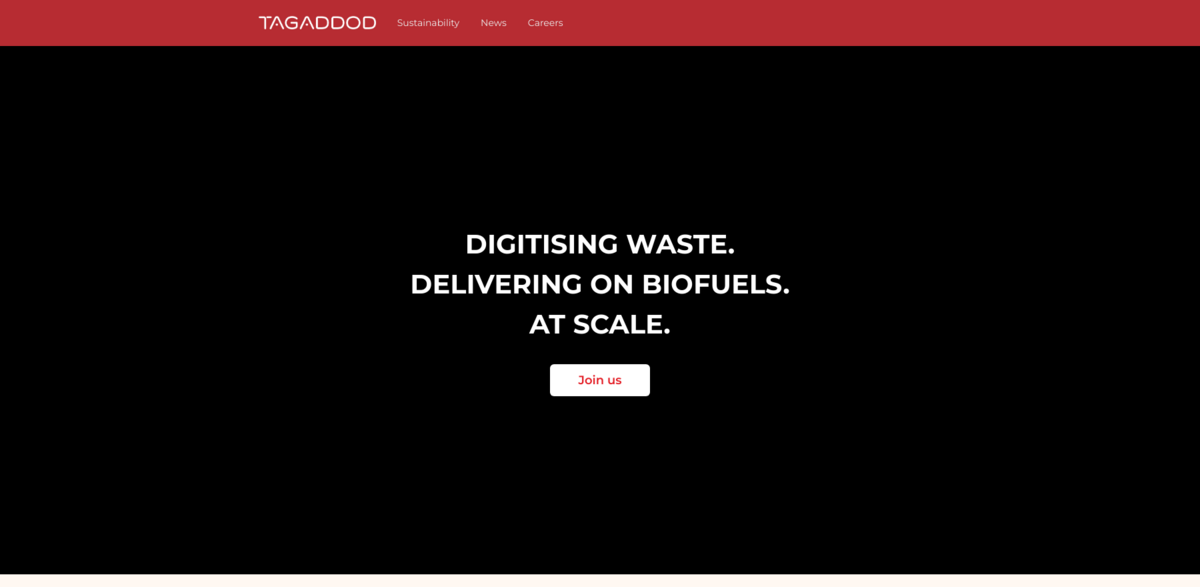What is Tagaddod?
Tagaddod is a pioneering project that’s all about digitising waste and delivering biofuels at scale. Born in Cairo back in 2013, it’s been leading the charge in sustainable energy innovation ever since. The core idea? Turning waste—like used cooking oil and other renewable feedstocks—into valuable biofuels, using cutting-edge technology to make the whole process smarter, more efficient, and way more sustainable. It’s not just about collecting waste; it’s about building a tech platform that empowers individuals and communities to create real impact and income, all while supporting global energy security and fighting waste.
Main Benefits and Key Milestones
Tagaddod’s journey is packed with impressive milestones that highlight its growth and impact:
- 2013: Founded in Cairo, Egypt, setting the foundation for sustainable energy innovation.
- 2015: Achieved ISCC certification, proving a strong commitment to international sustainability standards.
- 2016: Exported the first biodiesel shipment to Europe, stepping into the global renewable energy market.
- 2017: Shifted focus to tech-enabled solutions for efficient used cooking oil (UCO) collection.
- 2020: Hit a 5% net profit, showing that sustainability and profitability can go hand in hand.
- 2023: Became profitable through smart demand estimation clustering and auto-scheduling algorithms.
- 2024: Expanded operations in the Netherlands with on-site storage, a fully equipped lab, and new offices; also launched collection in Jordan.
Global Reach and Operations
Tagaddod operates across Africa, Asia, and Europe, specializing in collecting and aggregating renewable feedstocks like UCO, acid oils, waste oils, and fats. This extensive network ensures a steady supply of high-quality materials that feed into the global biofuels industry. The project’s footprint is growing, with active operations in Egypt, Jordan, and soon Saudi Arabia, plus storage facilities in Rotterdam. It’s a truly global effort to support green fuel production worldwide.
Tech-Driven Biofuel Infrastructure
What sets Tagaddod apart is its tech-savvy approach. The project leverages machine learning, data modeling, and innovative software and hardware solutions to optimize every step of the process. Products like the Collectors App, Consumer-Facing Apps, GAP, and Janet focus on traceability and sustainability, ensuring transparency from collection to delivery. This tech-driven infrastructure not only boosts efficiency but also promotes inclusive practices, shaping a future where clean energy is accessible and scalable.
Commitment to Sustainability and Certifications
Tagaddod’s dedication to sustainability is clear through its certifications and transparent practices. It holds key certifications such as:
- CORSIA: Carbon Offsetting and Reduction Scheme for International Aviation.
- ISCC EU: International Sustainability and Carbon Certification.
- Self Declaration: Ensuring sustainable and responsible UCO collection under ISCC standards, guaranteeing traceability from suppliers like restaurants and hotels.
These certifications back up Tagaddod’s promise to operate responsibly and maintain high industry standards, making sure every step contributes to a greener planet.
Impact on Sustainable Development Goals (SDGs)
- SDG 7: Affordable and Clean Energy – by promoting renewable biofuels.
- SDG 12: Responsible Consumption and Production – through waste collection and recycling.
- SDG 13: Climate Action – by reducing carbon emissions and managing carbon footprint.
- SDG 8: Decent Work and Economic Growth – creating income opportunities in waste collection.
- SDG 9: Industry, Innovation, and Infrastructure – leveraging technology for sustainable infrastructure.
- SDG 11: Sustainable Cities and Communities – supporting circular economy models in urban areas.
Looking Ahead: The Future of Tagaddod
Tagaddod is pushing the boundaries of what’s possible in the biofuels space. By collecting renewable feedstocks from households, HoReCa (hotels, restaurants, cafes), and local traders, it fuels a circular economy that’s both efficient and sustainable. Backed by experts and powered by innovative tech, the project is shaping a cleaner, smarter energy future. Transparency is key, with carbon footprint reports openly shared for 2022 and 2023, showing a real commitment to measuring and improving environmental impact. Plus, ESG reports underline a strong focus on social, environmental, and economic responsibility—covering everything from emissions reduction to diversity, equality, and employee well-being. Simply put, Tagaddod isn’t just transforming waste; it’s transforming the way the world thinks about energy and sustainability.


















